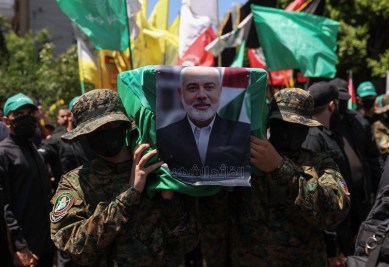Stay updated with the latest - Click here to follow us on Instagram
Hezbollah’s barrage of missiles, Iran’s retaliation: What Israel is bracing for as Middle East crisis deepens
Israel braces for a retaliation from Hamas, and on the other, fears that Tel Aviv’s long-running hostilities with Tehran may intensify into a full-blown war.

Last week, Hamas’s top leader Ismail Haniyeh was assassinated in Iran where he had gone to attend the presidential inauguration in Tehran. Two days later, Israel, which was already being accused of killing Haniyeh, announced that during a strike in July, their military had killed Hamas’s military wing chief Mohammed Deif. And then, on July 30, the Israeli military said that it carried out a “precision strike” in Beirut killing Hezbollah senior commander Fuad Shukr.
What these have done is escalate tensions in the already volatile Middle East, where, on one end, Israel braces for a retaliation from Hamas, and on the other, fears that Tel Aviv’s long-running hostilities with Tehran may intensify into a full-blown war.
monthly limit of free stories.
with an Express account.
To add to the tension, the Hezbollah, too, have stepped up its attack on Israel, adding another realm of uncertainty to the region.
What are the latest happenings?
The Hezbollah on Sunday fired at least a dozen Katyusha rockets into northern Israel, hitting Moshav Beit Hillel, according to news agency AFP. The Iran-backed group said that this was in response to Israel’s attacks on Kfar Kela and Deir Siriane in Lebanon which, it claims, injured civilians.
Video footage showed Israel’s Irone Dome system intercepting most of the missiles.
Hezbollah has fired thousands of drones and missiles at Israel since October 8, and Israel has retaliated in turn. What differentiates the Hezbollah from Hamas is its possession of a sophisticated arsenal of drones and precision-guided missiles. Analysts have been quoted by The New York Times (NYT) as saying that these missiles could overwhelm Israel’s aerial defences.
Where do things stand on the Iran front?
Following the killing of Haniyeh in Tehran, Iran’s supreme leader Ayatollah Ali Khamenei has promised “harsh punishment”. The Revolutionary Guard, in a televised statement, made a call of retaliation. “The warmongering and terrorist Zionist regime will receive harsh punishment in the suitable time, place, and capacity,” the statement read.
In April, Iran had shot over 300 missiles and drones at Israel, hitting their air base in the south. This had also prompted Tehran’s closest ally in the region, the Hezbollah, to step up attacks from Lebanon. Israel’s northern border towns and villages lie directly in the line of fire, particularly from Hezbollah’s rockets.
Referring to Haniyeh’s assassination, Ali Akbar Behmanesh, a prominent politician in Iran, had said in an interview: “This attack was a huge slap in the face for Iran’s status in the region. It humiliated our country and undermined our entire security apparatus, showed that we have serious holes in intelligence.”
What’s the state of affairs in Israel?
Israel has been fending off attack on multiple fronts for over months now but the recent killings of top Hamas and Hezbollah leaders have threatened escalation of the crisis.
According to a New York Times report, Israeli officials have urged residents to prepare food and water in fortified safe rooms and paramedics have conducted an emergency drill to practice in case of a full-scale war. “Hezbollah hasn’t shot at us with the aim of total war up until now. We have safe rooms, as well, and the Iron Dome. “But they might feel the need to respond now, and then there would need to be a response to that, as well,” a resident of Tel Aviv told NYT.
Similar fears were also seen in people living in northern Israel. Eli Rachevski, who works in the administration of Kfar Blum, a kibbutz in northern Israel, told NYT that residents were worried about a possible escalation. “The attack in the Golan Heights, which hit a soccer field in the village of Majdal Shams, was an event that could have easily taken place in their community,” he said.
Nisan Zeevi, who lives in Kfar Giladi near the Lebanese border, told NYT that there has been a strange calm in the last few days. “Only a few dozen residents remained in the village and those who remained were on alert,” he added.
How has the world reacted to the crisis?
India has issued advisories for both Israel and Lebanon. While it has asked nationals to avoid travel to Lebanon, New Delhi has asked citizens to remain vigilant and follow safety protocols in Israel. Besides, Air India has also stopped its flight to Tel Aviv in view of the crisis.
Similarly, many major airlines across the world have also suspended flights to and from Israel and Lebanon. OPSGROUP, a membership-based organisation sharing flight risk information, has advised traffic between Asia and Europe to avoid Iranian and Iraqi airspace.
The United States, meanwhile, has ordered additional combat aircraft and missile-shooting warships to the Middle East in response to threats from Iran and its proxies in Gaza, Lebanon and Yemen to attack Israel, the Pentagon said.
Defense Secretary Lloyd J Austin III said that the military will send one additional squadron of Air Force F-22 fighter jets, an unspecified number of additional Navy cruisers and destroyers capable of intercepting ballistic missiles, and, if needed, more land-based ballistic-missile defense systems.